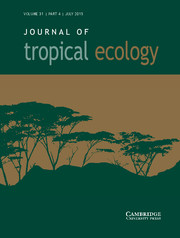Article contents
Tree recruitment after native frugivore extinction? A field experiment to test the impact of fruit flesh persistence in a tropical oceanic island
Published online by Cambridge University Press: 24 June 2022
Abstract
The loss of large frugivores leads to seed dispersal loss and regeneration failure of numerous large-seeded trees near mother trees. Although Janzen–Connell effects are considered as the primary underlying cause, other factors remain understudied. Here, we used a field experiment to test the impact of flesh persistence on the recruitment of two large-seeded Sapotaceae species that lost their dispersers. In the rainforest of Mare Longue (Réunion), we sowed 3840 seeds in a four-factor design: seed treatment (seed cleaning; flesh persistence), canopy closure (understory; gap), year of sowing (01/2018; 11/2019) and species (Labourdonnaisia calophylloides, Mimusops balata). We also used camera traps to evaluate the impact of extant vertebrates. Seed treatment was by far the most influential factor: flesh persistence led to seedling recruitment divided by 3,2 on average, mainly due to failure of germination or seedling emergence. There were also significant variations in recruitment between species, years and canopy closure levels, notably due to the behaviour of the invasive fauna, especially giant snails that could unexpectedly restore recruitment by feeding on fruit flesh. Together, our results demonstrate strongly depleted recruitment due to flesh persistence and the importance of field experiments to understand the processes at work in complex ecosystems with novel plant–animal interactions.
Keywords
- Type
- Research Article
- Information
- Copyright
- © The Author(s), 2022. Published by Cambridge University Press
References
- 4
- Cited by



